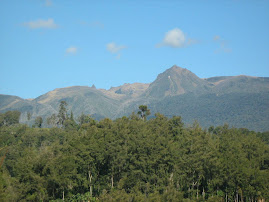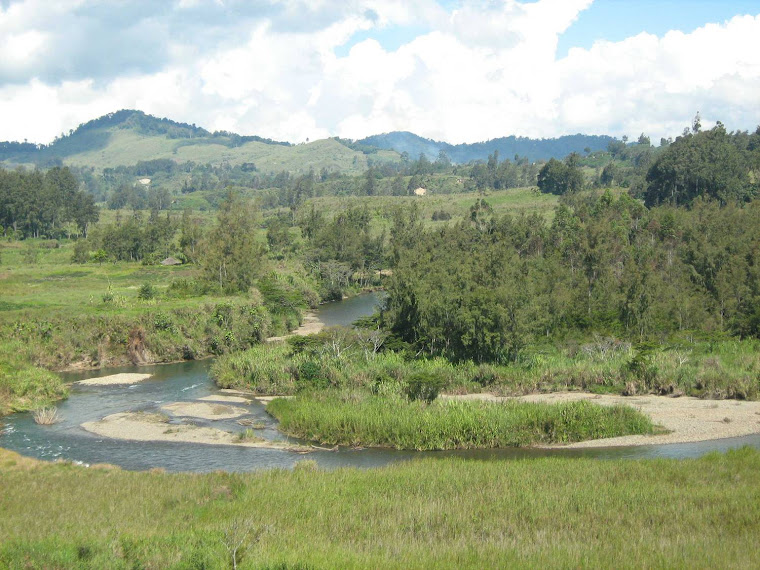Chinese Premier Wen Jiabao shakes hands with Prime Minister Somare at the opening of the First Ministerial Conference of the China-Pacific Island Countries Economic Development and Cooperation Forum in Nadi, Fiji, April 5, 2006. Somare described the relationship between the island countries and China as "sincere and friendly.” [Xinhua Photo]
Oceania still plagued by "big boy" politics
By Mathew Yakai in Changchun, China
THERE is understandably a great deal of cynicism about politicians in every country. Their reputation is probably now lower than that of any other profession because they have so often been exposed as liars and/or as corrupt.
In Oceania, from slaughtering pig to dishing out cash money to potential voters is the new found concept, completely debases the original notion of island “big manship” or “wantokism”.
When the National Alliance (NA) Party in Papua New Guinea (PNG) took power, it did so because the electorate had become aware of the modern politics and globalization trend after the populace merely survived on the brink of a dollar or less per day.
Prime Minister Sir Michael Somare promised a new era in politics, but it soon became clear that NA politicians were just as interested as their predecessors in the trappings and perks of politics, from chauffeur-driven cars to ministerial residences and luxury travel.
They were also just as hypocritical. Like their predecessors they were happy to pull strings for their friends.
They did not like the fact that their private lives were open to public scrutiny and, as their predecessors had done, did all they could to smear their critics.
What is evident today in PNG, and island politics is that every politicians with their cohorts fight out legal battles, even to the extent of deflating their personal accounts to retain the “power”, that they see as the harbinger for personal gain.
Questions always arise. Is it their birth right to fight legal battles to hold on the mandate given by people?
Politicians and bureaucrats are so selfish, power hungry and will never show any remorse by stepping down when implicated for alleged corruption.
Let’s get some perspective in order.
In early 2007, there were concerns over the handling by Prime Minister Somare of a defence board of inquiry, established to investigate the illegal removal of the fugitive Julian Moti from PNG to Solomon Islands.
After implicated in the inquiry, the Prime Minister pressured the defence minister into dissolving the board of inquiry, sacked him and later appropriated his portfolio, thereby gaining control over the contents of the relevant report.
The Grand Chief is respected for his fervent stand on the principal of democracy in PNG, the region and the world. But his action is contradictory! There are other inquiries that he aborted or procrastinated to date.
The story does not end at the highest office. Allegations that Timothy Bonga, the recycled MP for Nawaeb and made the chairman of the Powerful Public Accounts committee should also step down from his office while the investigation into an alleged US$30 million diplomacy exchange with Taiwan, (renegade province of Great China) is underway.
Diplomat Dr. Florian Guban is also included in this serious allegation that would have jeopardized the sovereignty of PNG.
Media reports revealed that the Taiwanese vice Premier Chiou I-jen allegedly involved in the bid to win PNG’s favor, has announced his willingness to resign from the ruling party.
“My role in the scandal has made me deeply ashamed in the face of our nation and our people,” Mr. Chiou said.
Sir Michael Somare had known the former water chief Mr. Bonga and diplomat Dr. Guban, and this commentary concludes that Sir Somare has knowledge of this shameful scandal. But will they all resign from their respective posts to save the reputation of PNG?
Politicians in PNG have lost the ability to feel ashamed over allegations of stealing and misappropriation. Incidents like the NPF inquiry, the Julian Moti affair, the Taiwan scandal, the US$40 million saga in Singapore and the Kerema and Madang BSP branch robberies hint at systemic corruption, which will affect PNG’s regional and international standing.
Bulolo MP Sam Basil said in Lae recently, “… I am a bit saddened to see these people, who have exhausted their vision and still around, running the country. In my view, you cannot teach old dog new tricks. With the advance of globalization, economics, trade, we need to have leaders who are focused on those issues and take the country from here and move forward.”
Finland, Denmark, and New Zealand are perceived to be the world's least corrupt countries, and Somalia and Myanmar are perceived to be the most corrupt, according to the 2007 annual survey by the Berlin-based organization Transparency International (TI).
TI states that PNG had significantly improved its rating. Samoa, Kiribati, Vanuatu and Solomon Islands do not have serious corruption problems compared to Oceania’s largest island country with abundant natural resources, PNG.
Politicians, bureaucrats and law enforcing agencies always accuse the petty criminals, rapists, murderers, and other elements that go against the norms and spirit of the laws, that they discourage foreign investors.
But what do they say about institutionalized crimes, or simply, using their power for personal gains. This does have a devastating impact on the economy.
Normal trend in other countries have revealed that politicians, bureaucrats, company CEO’s and influential figures whose role have direct impact on people resign when implicated for alleged corruption.
These help in several ways. They maintain their reputation, the organization, the country and finally but not the least making it possible for a speedy and impartial investigation into alleged corruptions.
New York Times reported that Prime Minister Bertie Ahern of Ireland, one of Europe’s longest-serving leaders, announced his resignation in May 2008.
He denied accusations of corruption in the 1990s, when he was finance minister, but said he was quitting, preventing his government’s work from being “constantly deflected by the minutiae of my life, my lifestyle and my finances.”
During Mr. Ahern’s 11 years in office, Ireland’s economy has undergone a transformation to become one of the most robust in Europe.
“I want everyone to understand one truth above all else. Never, in all the time I have served in public office, have I put my personal interest ahead of the public good,” NYT quoted Mr. Ahern.
Ehud Olmert, Israel's prime minister said he will not stand for the leadership of his Kadima party, instead step down once Kadima has chosen a new leader after the September 17 poll, Aljazeera reports.
He has been under pressure to resign since police opened an inquiry into allegations of corruption during his time as mayor of Jerusalem.
Olmert, 62, has repeatedly denied any wrongdoing in connection to the claims that he received cash-stuffed envelopes from a U.S. businessman, but he said he would step down if indicted.
Los Angeles times reported May 18 last year that World Bank President Paul D. Wolfowitz announced his resignation effective June 30, 2007, after weeks of controversy over accusations that he had arranged a job transfer and substantial salary increases for his companion, who was a bank official.
The Wolfowitz controversy involved allegations that he had improperly arranged a promotion and raises for Shaha Ali Riza, a bank employee with whom he had been involved for several years before Bush named him to the institution’s top job.
President Pervez Musharraf of Pakistan resigned recently rather than face impeachment.
Leaders of the two major parties in the coalition announced that they would seek Mr. Musharraf’s impeachment on charges that include illegally suspending the Constitution and imposing emergency rule last November and wrongly dismissing nearly 60 judges under that decree.
There are numerous examples world over.
Island leaders are not like Mohammed Soeharto, Ferdinand Marcos and Mobutu Sese Seko who ripped off up to $US50 billion ($A67.7 billion) from the people of Indonesia, the Philippines and Zaire, equivalent to the West's entire annual aid budget, as stated by anti-bribery campaigners.
But what ever the nature of the alleged corruption, islanders will wait longer to see their leaders resign voluntarily so that investor confidence is retained and strengthened.
Aid donors require transparency and accountability among leaders and institutions in Oceania.
Genuine donors like China have been accused by regional powers for allegedly corrupting Island states for providing non-conditional aids, but this is not Beijing’s problem as it does not interfere in islands sovereignty. After all, it’s how leaders run the affairs of their countries.
Former US president Richard Nixon in his speech, “Au Revoir” when resigning during the Watergate scandal said, “…we think that when someone dear to us dies….when we lose an election… when we suffer a defeat that all is ended.”
“Not true. It is only a beginning, always. The young must know it, the old must know it. It must always sustain us, because the greatness comes not when things go always good for you, but the greatness comes and you are really tested, when you take some knocks, some disappointments, when sadness comes, because only if you have been in the deepest valley can you ever know how magnificent it is to be on the highest mountain.”
But Island leaders never in their life want to be in the deepest valley. Only God knows their reasons!
Note: “Asia-Pacific Perspective: China +” looks at Chinese society, culture, economy, governance and China’s role within the Asia Pacific region and the world over. It mainly focuses on how Oceania can learn from China’s experience. The writer is a PNG student studying in China.









